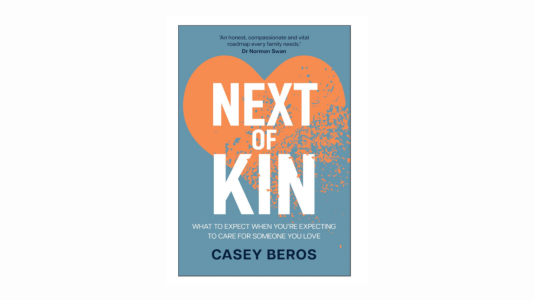Hurry up and wait: tips for mitigating the torment of awaiting medical results
- Replies 0
When TV presenter and health communicator Casey Beros learned her Dad was terminally ill, she moved her family across the country to become his carer.
Casey’s new book, Next of Kin: What to Expect When You're Expecting to Care for Someone You Love (Wiley $34.95, 27 August 2025), shares her personal story and provides a heartfelt and practical guide to navigating the complicated world of care.
In this edited extract from the book, Casey looks at the agony of awaiting medical results and first-hand tips for mitigating the torment.
I’m not sure who designed the system of test, wait, get results, but I’ve got a fair bit to say to them and wouldn’t mind at least sending them a sternly worded email.
It’s the reality of science, but it’s also a special type of torture to ask someone potentially facing their mortality to wait days, even weeks, to learn their fate.
I can order purple p**** party straws on the internet and have them on my doorstep within 24 hours (thanks Amazon), but when it comes to waiting for life-changing medical results, our technologies, systems and bandwidths to implement them seem stuck in 1952.
While bigger, better minds than mine are no doubt working on ways to speed things up when it comes to diagnoses, there are three key things I’ve learned along the way that may hold some value if you or someone you love are undergoing the torturous wait for results:
#1: You can’t hack the system, but you can work better within it.
If you’ve ever had a pregnancy scan (or seen one in movies), you might be familiar with the imaging technician calling out a heartbeat or cute little body part.
When it comes to illness and disease, though, there’s a clear delineation of role and responsibility: the imaging technicians’ job is to take the pictures, not usually to report to you in the moment.
There’s a good reason for this: the images have to be interpreted by a doctor who specialises in imaging (a radiologist) and then delivered to your treating doctor, who can assess their relevance in the bigger picture of your health.
As tempting as it might be, don’t ask the imaging staff for results or even what they can see; they aren’t allowed to tell you.
Likewise, don’t try to read the technician’s expressions for clues. They are working with complex machines and trying to find clear pictures of body parts in what to anyone else looks like mud.
Then, depending on myriad factors, how you receive those results can follow a number of paths. Your doctor may ask you to make another appointment to get the results, they may call or text you, or they may do nothing and expect you to follow up.
Don’t assume anything, including the old adage ‘no news is good news’. It’s your job to get your results.
#2: You can’t skip the worry, but you can learn to manage it.
Worry is one of those useful emotions that can spring us into action, but it can also make us feel unnecessarily anxious in the face of things we’re not actually in control of.
While the results are out of your control, there are a couple of things you do have some control over:
When it comes to helping manage worry in others, all you can do is encourage them to practise the same things you are. Don’t make promises you can’t keep; if there’s a chance things won’t be okay, offering assurances that aren’t yours to give isn’t helpful, nor do I think it is kind.
You cannot hope them well, as much as you’d like to. Instead, aim for optimism. Don’t shoo their fears away. If they’re afraid – let them be afraid.
#3: Keep an open mind.
Like life, healthcare is a bit of a jigsaw puzzle. Some pieces fit together easily, while others seem like they belong to different puzzles altogether. Results help paint a picture, but it’s a picture of a moment in time and there’s room for both human and scientific error.
This depends wildly on the context, but if you take one set of results to 10 different practitioners, you’ll likely get a slightly or significantly different interpretation of them, which is why becoming a great advocate for yourself and the people you love is so important.
Casey’s new book, Next of Kin: What to Expect When You're Expecting to Care for Someone You Love (Wiley $34.95, 27 August 2025), shares her personal story and provides a heartfelt and practical guide to navigating the complicated world of care.
In this edited extract from the book, Casey looks at the agony of awaiting medical results and first-hand tips for mitigating the torment.
I’m not sure who designed the system of test, wait, get results, but I’ve got a fair bit to say to them and wouldn’t mind at least sending them a sternly worded email.
It’s the reality of science, but it’s also a special type of torture to ask someone potentially facing their mortality to wait days, even weeks, to learn their fate.
I can order purple p**** party straws on the internet and have them on my doorstep within 24 hours (thanks Amazon), but when it comes to waiting for life-changing medical results, our technologies, systems and bandwidths to implement them seem stuck in 1952.
While bigger, better minds than mine are no doubt working on ways to speed things up when it comes to diagnoses, there are three key things I’ve learned along the way that may hold some value if you or someone you love are undergoing the torturous wait for results:
#1: You can’t hack the system, but you can work better within it.
If you’ve ever had a pregnancy scan (or seen one in movies), you might be familiar with the imaging technician calling out a heartbeat or cute little body part.
When it comes to illness and disease, though, there’s a clear delineation of role and responsibility: the imaging technicians’ job is to take the pictures, not usually to report to you in the moment.
There’s a good reason for this: the images have to be interpreted by a doctor who specialises in imaging (a radiologist) and then delivered to your treating doctor, who can assess their relevance in the bigger picture of your health.
As tempting as it might be, don’t ask the imaging staff for results or even what they can see; they aren’t allowed to tell you.
Likewise, don’t try to read the technician’s expressions for clues. They are working with complex machines and trying to find clear pictures of body parts in what to anyone else looks like mud.
Then, depending on myriad factors, how you receive those results can follow a number of paths. Your doctor may ask you to make another appointment to get the results, they may call or text you, or they may do nothing and expect you to follow up.
Don’t assume anything, including the old adage ‘no news is good news’. It’s your job to get your results.
#2: You can’t skip the worry, but you can learn to manage it.
Worry is one of those useful emotions that can spring us into action, but it can also make us feel unnecessarily anxious in the face of things we’re not actually in control of.
While the results are out of your control, there are a couple of things you do have some control over:
- Doing what you can to smooth the path by thinking ahead, communicating well, and anticipating needs and obstructions (such as by pre-booking a doctor’s appointment to get results).
- Managing the worry within yourself. Managing worry looks different for everyone, but some self-enquiry is a good place to start. Ask yourself: ‘Will worrying about this change the outcome?’ If the answer is no, in theory you should try your best to let it go. But when that’s impossible, all you can do is:
- Give the worry somewhere to go. Book a session with a therapist, trusted friend or family member to talk it out. You can even write it down. Just get it out of your head.
- Practise positive (or neutral) self-talk. It’s possible the result might not be what you want, but you’re not there yet. There’ll be plenty of time to worry, strategise and act if your fears materialise. Give yourself the gift of not knowing before you know. And, what if the results do go your way? Stranger things have happened.
- If you can’t let it go, allocate some designated worry time. Pick a timeframe in which you’re allowed to worry, like for your entire shower or while you do the dishes or for the next 10 minutes. Worry away, let your mind go where it needs to and acknowledge what comes up, then bring it back into the present.
When it comes to helping manage worry in others, all you can do is encourage them to practise the same things you are. Don’t make promises you can’t keep; if there’s a chance things won’t be okay, offering assurances that aren’t yours to give isn’t helpful, nor do I think it is kind.
You cannot hope them well, as much as you’d like to. Instead, aim for optimism. Don’t shoo their fears away. If they’re afraid – let them be afraid.
#3: Keep an open mind.
Like life, healthcare is a bit of a jigsaw puzzle. Some pieces fit together easily, while others seem like they belong to different puzzles altogether. Results help paint a picture, but it’s a picture of a moment in time and there’s room for both human and scientific error.
This depends wildly on the context, but if you take one set of results to 10 different practitioners, you’ll likely get a slightly or significantly different interpretation of them, which is why becoming a great advocate for yourself and the people you love is so important.









